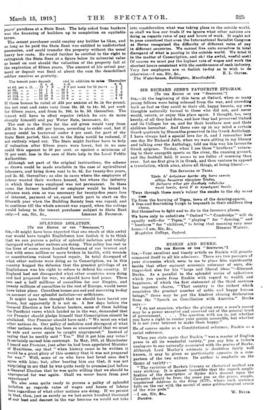SIB RICHARD JEBBIll FAVOURITE EPIGRAM. ITO TIEL EDITOR Or ERR
SPROIATOR.")
Sia,—At the beginning of this term at Oxford, when so many young fellows were being released from the war, and crowding back as fast as they could to their old, happy haunts, my own thought, naturally turned to those who did not, and never would, return, or enjoy this place again. I thought, too, very keenly, of all they had done, and bow they had preserved Oxford and its Colleges for us, and for their brothers now and their children hereafter. And there rose up in my mind a certain Greek quatrain by Simonides preserved in the Greek Anthology. I have always had a special love for it. and I remember how one day Sir Richard Jobb, when wo were sitting in my library and talking over the Anthology, told me this was his favourite Greek epigram. To-day, when I see these "brothers" return- ing to their energetic sports on the river, the running ground. and the football field, it seems to me fuller cf meaning than ever. Let me first give it in Greek, and thou venture to append a translation, which aims, above all things, at being literal
Tug Saloom. OP TGOEA.
Tierra di drOistrriae dperite ,off Cerro /ANEW algepe deuestina teipmcdpos Tryfor, Ot polikorro ,614r stir Asuespla rtea/eZar waist herds, &viol a. tr rpeadxouri thirds.
'Tomas through thee, men's valour the smoke to the sky never rose Up from the burning of Tegen, town of the dancing-spaces, A free and flourishing burgh to bequeath to their children they chose, But themselves to fight and to die in the foremost place*.
We have only to substitute "Oxford "—" Cambridge" will do equally well—for " Tegea." "playing" for " dancing," and " brothers " for "children," to bring that meaning very near






































 Previous page
Previous page